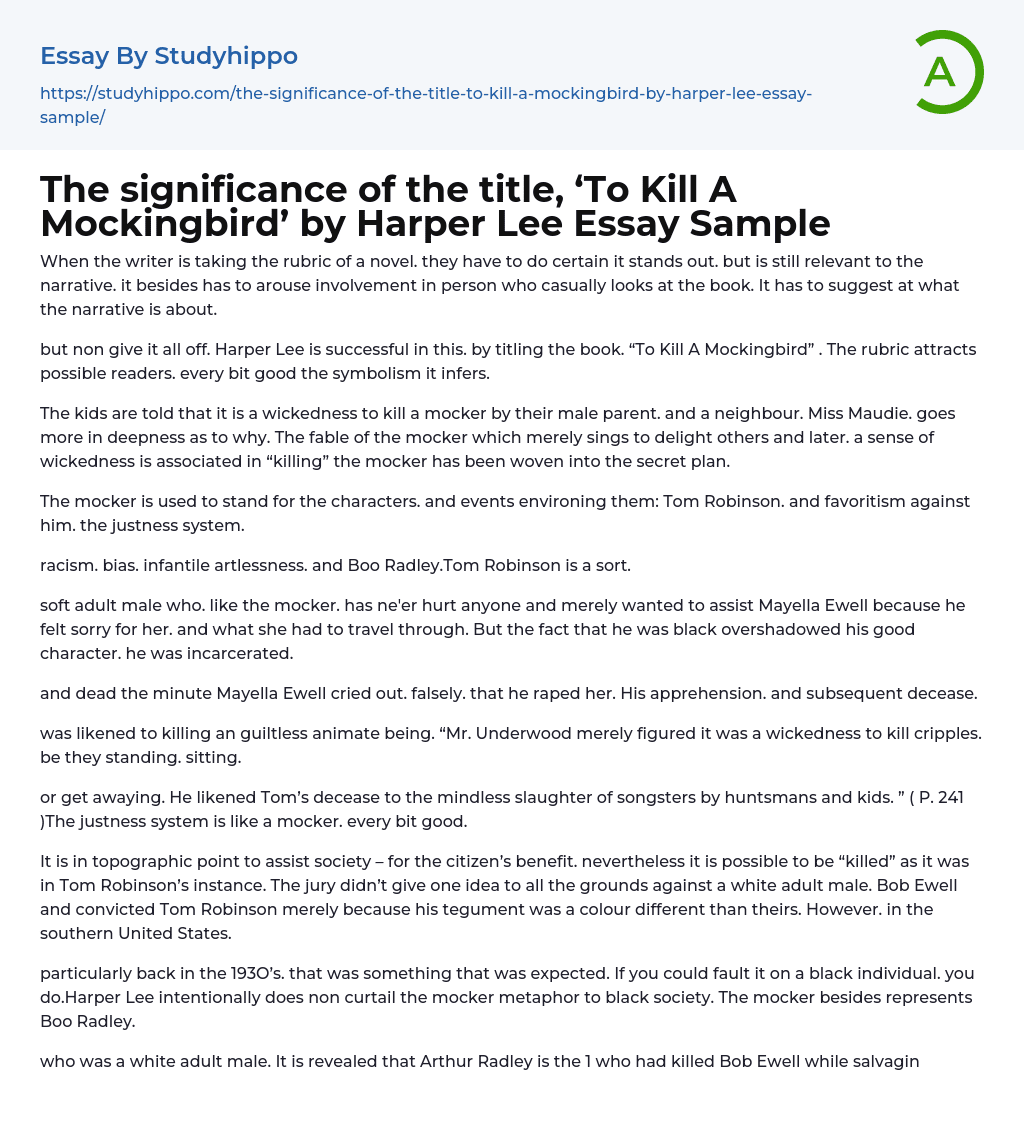

The significance of the title, ‘To Kill A Mockingbird’ by Harper Lee Essay Sample
The goal for a novel's structure is to make it captivating and pertinent to the plot, drawing in potential readers while also providing clues about what will unfold.
"To Kill A Mockingbird" by Harper Lee attracts potential readers because of its effective use of title and symbolism, leading to its success.
The male parent and a neighbour inform the children that killing a mocker is a sin. Miss Maudie elaborates on this point and explains that the fable of the mocker, which sings solely for the pleasure of others, creates a sense of wrongdoing when it is "killed." This story line is woven into the plot.
The characters and events surrounding them, including Tom Robinson and the injustice he faced in the justice system, are represented by the mocker.
Tom Robinson is a type of person characterized by raci
...sm, bias, and immature artlessness, as well as the infamous Boo Radley.
Similar to the mocker, a gentle adult male who never caused harm attempted to aid Mayella Ewell out of compassion for her struggles. Unfortunately, his virtuous nature was disregarded due to his race and led to his unjust imprisonment.
The apprehension and death of the accused occurred after Mayella Ewell cried out that he had raped her, which was later found out to be false. The above text should be kept with .
Comparing it to the murder of an innocent creature, Mr. Underwood believed that it was a sin to kill those with disabilities, regardless of whether they were standing or sitting.
The justice system is compared to a mocker by the speaker who also draws a parallel between Tom's death and the senseless killing of birds by hunters and children
(P. 241)
Although its purpose is to serve society and benefit its citizens, as shown in Tom Robinson's case, it is also possible for the justice system to fail and have unjust outcomes. The jury disregarded all evidence against a white man and convicted Tom Robinson solely on the basis of his skin color. This is unfortunately a common occurrence in the southern United States.
Back in the 1930's, it was expected to blame black individuals for everything. Harper Lee deliberately extends the mockingbird metaphor beyond black society to also include Boo Radley.
It is disclosed that the one who saved the children's lives and ended up killing Bob Ewell was Arthur Radley, a white male adult. Despite this, Heck Tate refuses to hold him accountable as he believes it would lead to unnecessary speculation.
As Jem and Scout become more aware of the harmful nature of society, they realize that involving Boo Radley, against his wishes, and bringing him into the spotlight would be akin to killing a mockingbird, as Scout puts it.
As children, they lack sophistication in their art. They discover that appearances can be deceiving and that to uncover the complete truth, it is necessary to delve deeper. Lookout realizes this when considering the case of Tom Robinson.
Tom used to face unfair treatment and discrimination based on his skin color, which led to a disadvantageous position for him. However, the circumstances have gotten better now.
Scout discovered the prevalence of racism and prejudice when faced with the contrasting experiences of white and black individuals. The demise of the "mockingbird," symbolic of pure innocence, is also uncovered.
Based on my personal experience, I have observed the presence of
numerous individuals who enjoy mocking others in real life. These individuals may feel inclined to stand against a cause supported by the majority and may resort to any means necessary to halt progress.
Observing the presence of favoritism in today's society, as well as in the book, is indicated by the existence of mockers. Despite its subtlety, it persists.
Mother Teresa and Martin Luther King Jr. both encountered opposition while working towards positive change for the betterment of society, which is illustrated by MLK's experience.
Enduring continual ridicule can present a difficult situation, demanding that the target foster a determined mentality to endure ongoing censure and dissenting perspectives.
Harper Lee's 'To Kill A Mockingbird' imparted an invaluable lesson - the importance of refraining from judging a person solely based on their skin color or societal perception. This lesson remains unmatched by numerous other authors.
- Aldous Huxley essays
- Alice Walker essays
- Amy tan essays
- Anne Bradstreet essays
- Anton Chekhov essays
- Arthur Miller essays
- Augustine essays
- Bertolt Brecht essays
- Booker T Washington essays
- Carol ann duffy essays
- Charles Dickens essays
- Charlotte Perkins Gilman essays
- Chinua Achebe essays
- Christina Rossetti essays
- Consider The Lobster essays
- Edgar Allan Poe essays
- Elizabeth Bishop essays
- Emily Dickinson essays
- Ernest Hemingway essays
- F. Scott Fitzgerald essays
- George Orwell essays
- Harper Lee essays
- Homer essays
- James Baldwin essays
- Jane Austen essays
- John Donne essays
- John Steinbeck essays
- Kate Chopin essays
- Kurt Vonnegut essays
- Langston Hughes essays
- Leonardo Da Vinci essays
- Mark Twain essays
- Mary Shelley essays
- Maya Angelou essays
- Nathaniel Hawthorne essays
- Oscar Wilde essays
- Percy Bysshe Shelley essays
- Peter Skrzynecki essays
- Phillis Wheatley essays
- Poets essays
- Ralph Waldo Emerson essays
- Ray Bradbury essays
- Richard Rodriguez essays
- Robert Browning essays
- Robert Frost essays
- Robert Louis Stevenson essays
- Seamus Heaney essays
- Sherman Alexie essays
- Sophocles essays
- Stephen King essays



